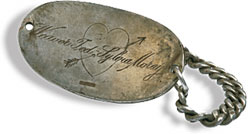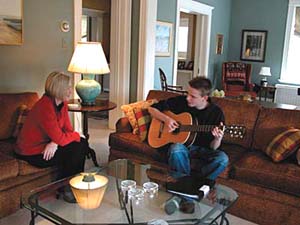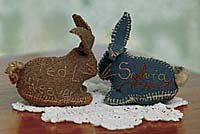 |
 |
| current issue |  |
past issues |  |
send a letter/news |  |
address update |  |
advertise |  |
about us |  |
alumni home |
Features
Connected by CouragePage 2 of 2
Leaving no tracks
When he hit the ground, Weaver did what he had been trained not to do: he shed his parachute and left it where it fell. He could hear gunfire nearby. There was no time to roll up the silk and hide it.
Weaver had landed in a wheat field. He began crawling on his hands and knees, so he wouldn't leave a trail. Along the way, he jettisoned anything that could connect him to his family back home. He buried pictures, a silver bracelet decorated with a set of wings that had his future wife's name engraved on the back, all but one of his silver officer insignia bars.
 Courtesy of Sylvia Moray Weaver
Courtesy of Sylvia Moray Weaver
|
Fifteen years later, the son-in-law of the farm's owner would find the silver bracelet and have it returned to Weaver.
The soldiers carried escape packets containing German, French and Belgian money, enough concentrated food to last a few days, silk maps of Europe and cards with vital phrases written in German and French. Weaver memorized a few of the phrases and then tore up the cards and buried them. He spent the day lying in the wheat field, watching a house nearby and the family that lived there. That afternoon, he got up, walked toward them and said, "Ich bin Amerikanische pilot. Guten tag." ("I am an American pilot. Good day.")
Given a pair of coveralls, Weaver was sent back to the field, where he covered himself with wheat stalks. Farmer Schoemaker later brought him to meet Jan Roorda, who was with the Dutch Underground.
Hidden houseguests
From July to November, Weaver moved whenever danger appeared. He had met another American: they were living in the woods when the van Harten family offered to hide them.
The Germans had released Annie van Harten's father from digging traps for tanks, but he had not yet returned home when the two pilots arrived in Nijverdal. Henk, the van Hartens' oldest son, had just been freed from a concentration camp. The stakes were high.
 Sharing stories: President Ann Weaver Hart and Micha van Veldhuizen,
the great-grandson of the Dutch family that hid her father during World War II.
Photo by Katelyn Dolan '07
Sharing stories: President Ann Weaver Hart and Micha van Veldhuizen,
the great-grandson of the Dutch family that hid her father during World War II.
Photo by Katelyn Dolan '07
|
And yet, for the next six months, the van Harten family sheltered the men, hiding them in the colonnade between the front room and the dining room whenever the Germans came to search the house.
Then, when the family heard that Nazi soldiers had discovered people hiding in colonnades and were shooting them through the walls, the van Hartens built a new hiding place in their sitting room.
Cutting a two-foot-square hole under a daybed, they dug out an area below it four feet deep and seven feet square. Under cover of night, the soil was carried out of the house in buckets and dumped in the garden so as not to arouse the neighbors' suspicions. That hole in the dirt became the Americans' bedroom.
The men passed the time playing cards--pinochle and bridge--with van Veldhuizen's grandmother and the other family members. Annie's sister, Gerritdina, taught Weaver to knit.
 Ted Weaver made two cloth rabbits to pass the time while in
hiding in the Netherlands.
Courtesy of Sylvia Moray Weaver
Ted Weaver made two cloth rabbits to pass the time while in
hiding in the Netherlands.
Courtesy of Sylvia Moray Weaver
|
As the Germans moved across the Netherlands, they occupied Dutch homes and then abandoned them. When the van Hartens learned their house was going to be the next command post, they hurriedly moved Weaver and the other American pilot to the home of a baker in town, who hid the men for two weeks until the Nazi soldiers moved on.
Staying in touch
Weaver hid with the van Hartens until the war ended. After returning to America, he kept in touch with the family. Hart met Micha's parents when they visited her father during a trip to the United States in the 1980s. They exchanged Christmas cards thereafter but lost contact after Ted Weaver died in 1986 and the van Veldhuizens moved to Indonesia. Then, early this winter, the family found Hart on the Internet.
"That was a surprise, to find out she was a university president," Micha says. "I know Ann's really busy, she has a lot of things to do. But she still has time for me." And they both have had time to share the stories that have been passed on to them. Stories that intersect their lives.
Hart tells of Jan Roorda, the first man to help her father. Shortly afterwards, he was arrested and sentenced to death. "Jan was scheduled for execution the same day the town was liberated," Hart says. "He said the firing squad was marching one way down the street and the Canadian army was coming in the other direction. All those people who helped him took a chance," she continues.
"Even though there were threats," Micha says. "And they weren't hollow threats. People were killed for helping the Americans." "My grandmother told me of the searches, of the Germans coming to the house and shoving them aside, shouting."
Reflections on courage
Hart is contemplative. "My dad's stories always made me wonder if I would have had the moral courage to do what they did," she says. "It's quite a high standard when you're a little kid trying to figure out whether you're brave or not. I wouldn't be here if a whole lot of people in Europe had not had that moral courage."
Hart seems especially moved when she tells her mother's story. Like so many women left behind, her mother had no idea if her soldier was dead or alive.
"Month after month went by without a word. My mother was a college student," Hart says. Her father was allowed to send only a brief telegram saying he was alive. Her voice catches and then she finishes, "My grandfather got the telegram and went to find my mother. She was in class."
Tears come when she mentions what her mother said was the hardest part: her friends and the men who didn't come home to them. "It could have been so different for us," Hart says. "Any one of those people could have turned my father in, the farmer, anyone."
"So many what-ifs," Micha says. "So many." ~
Jody Record '95 is a news correspondent for the Union Leader newspaper in Manchester, N.H. A version of this article appeared in the April 11 edition of the New Hampshire Sunday News.
Page: < Prev 1 2Easy to print version
blog comments powered by Disqus

